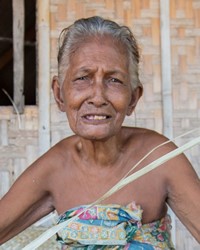Wakatobi, Kaledupa in Indonesia

Photo Source:
Copyrighted © 2026
Muslianshah Masrie - Shutterstock All rights reserved. Used with permission |
Send Joshua Project a map of this people group.
|
| People Name: | Wakatobi, Kaledupa |
| Country: | Indonesia |
| 10/40 Window: | Yes |
| Population: | 173,000 |
| World Population: | 173,000 |
| Primary Language: | Tukang Besi North |
| Primary Religion: | Islam |
| Christian Adherents: | 3.00 % |
| Evangelicals: | 0.40 % |
| Scripture: | Translation Started |
| Ministry Resources: | No |
| Jesus Film: | No |
| Audio Recordings: | Yes |
| People Cluster: | Tukangbesi of Sulawesi |
| Affinity Bloc: | Malay Peoples |
| Progress Level: |
|
Introduction / History
The Tukangbesi Utara or the Northern Wakatobi are indigenous people who speak the Tukangbesi language. They live in the southeastern region of the Sulawesi Islands of Indonesia. The Tukangbesi make their living by agriculture and fishing. Current information shows that their culture is virtually the same as the Tukangbesi Selatan. The Northern Wakatobi however claim a separate identity for reasons not yet clear to researchers.
Indonesia gained its freedom from the Netherlands in 1949. It is the largest Muslim majority country in the world as well as the fourth largest nation by population. Indonesia consists of over 17,000 islands of which 10,000 are inhabited. Indonesia has oil, natural gas and mineral assets but the average Indonesian does not benefit from the nation's wealth.
Only gospel recordings available in the Tukangbesi language.
What Are Their Lives Like?
The Northern Wakatobi base much of their livelihood on agriculture. The volcanic soil of the islands is very fertile. Many are also fishermen or boat-builders. Rice is the staple rice along with peanuts, maize, cassava melons, mangos, sweet potatoes. Most villages have a few pigs, chickens and goats to supplement their diets. Since economic opportunities are lacking in their home islands, many Wakatobi young people move to other locations in Indonesia. Some of these never return. The people of Tukangbesi Utara origin live throughout much of eastern Indonesia.
Northern Wakatobi houses are raised above ground and built of sturdy planks. The roofs are made of small planks, palm leaves, or iron. The houses have only a few small windows. Most villages have markets where woven silk, cotton, and other fabrics are traded.
Although parents are involved in the arrangement of the marriages, the young people are free to choose their partners. After marriage, the couple lives with the bride's family until the husband can build his own house. Both spouses are actively involved in caring for their children.
The Northern Wakatobi believe in education for both boys and girls. Due to the remoteness of their location, some children are not able to attend school. The Wakatobi have a tradition of literary skill, and this is displayed in culturally important books, songs and long poems.
What Are Their Beliefs?
Most Northern Wakatobi people are Sunni Muslims, but they still believe in various kinds of supernatural forces and spirits. Ancestral spirits can help in some instances or bring bad luck such as illness. The Northern Wakatobi people also have a high regard for nature because it is God's creation. Sufi Islamic mysticism abounds, and it focuses on knowing God. Many of the Northern Wakatobi people also believe in reincarnation because of Hindu influence on their culture. Only a small fraction of the Wakatobi claim to be followers of Jesus Christ.
What Are Their Needs?
The Northern Wakatobi need to understand that Isa or Jesus is more than a human prophet as he is portrayed in Islam. He is the Son of God and the Savior of the world. The Northern Wakatobi would benefit from having believers bring them solar panels and modern medicine.
Prayer Points
Ask the Lord to send workers to the Northern Wakatobi.
Pray that the few Wakatobi believers would find each other and grow in the faith.
Pray that tribal leaders would become interesting in hearing about Isa.
Pray that the Bible be translated into the Tukangbesi language.
Pray that the Lord raises up a growing, Biblical church among the Northern Wakatobi in this decade.